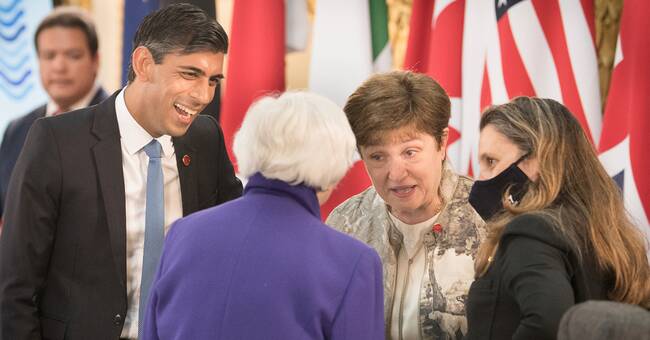Although the major powers in the G7 agree on a global minimum tax, more steps remain before it can become a reality.
For that, greater support is needed, according to Robert Bergqvist, chief economist at SEB.
- The next step is the G20.
If you get the G20, it is very comprehensive.
They represent a much larger part of the world economy, which also includes emerging economies such as China and India and a number of such countries, says Robert Bergqvist.
"Great to agree on in this area"
The G20 finance ministers and central bank governors will meet in Venice in July.
But today's agreement is an important signal.
The G7 includes the United States, the United Kingdom, Germany, Japan, Italy, Canada and France, as well as a representative of the EU.
It should make it easier for the G20 to agree, says Bergqvist.
What is historic about the agreement is, according to Robert Bergqvist, that the agreement concerns areas that it is usually up to each individual country's governments to decide on.
- Here you put a bar, a lower limit.
Agreeing in this area is great, says Robert Bergqvist.
- They have come a long way along the way considering that they are so central in the world economy and should make it easier for the G20 to agree, says Bergqvist.
Agreement this summer
The OECD has also previously said that it is aiming for an agreement on the issue this summer.
Sweden's Minister of Finance Magdalena Andersson (S) has said that she is positive to the proposal.
Claes Hammarstedt, tax expert at the Confederation of Swedish Enterprise, believes that the decision from G7 is not surprising.
- A great deal of work is underway within the OECD and G20 countries to produce a package with a digital tax and a minimum tax.
That work is progressing and an agreement is expected to be reached.
The Confederation of Swedish Enterprise is actually against a global minimum level because this can be seen as an encroachment on tax sovereignty.
- Large countries with large markets have a natural appeal.
Smaller countries must be able to compete in other ways.
If you can do it with the tax rate, we believe that you should be able to do it, says Claes Hammarstedt.
Javascript is disabled
Javascript must be turned on to play video
Read more about browser support
The browser is not supported
SVT does not support playback in your browser.
We therefore recommend that you switch to another browser.
Read more about browser support
What does a global minimum tax mean for companies?
Åsa Hansson, associate professor and economist at Lund University, explains.
Photo: SVT

